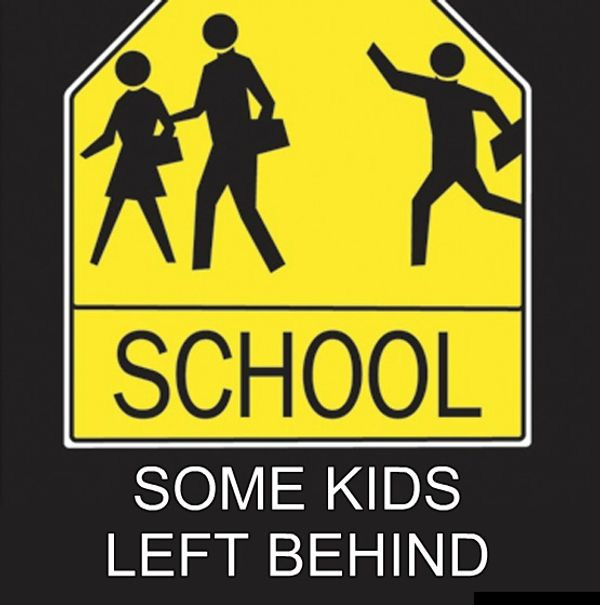But only when there's money at stake, OK?
No two ways around it: Special Education programs are expensive. And the federal government is committed to the crazy idea that every child deserves a fair education that helps them learn as much as they can, even the kids with physical, learning, and intellectual disabilities, so special education is not something public schools can just decide not to do, even if the schools don't have a lot of money. (Which pretty much describes all schools not in rich taxing districts.) (Also, please do not even get us started on how charter schools and private schools funded by vouchers are often allowed to skip out on that mandate, which is why "school choice" often leaves behind the kids who need the most help. We will save that rant for another day.) But guess what! Thanks to some fine investigative journalism by the Houston Chronicle, we learn that a whole bunch of Texas school districts, under pressure to cut the costs of special education programs, have found a novel way to do so: exclude kids who don't speak English well, even though English language learners are every bit as entitled to special ed services as native speakers. Hey, since their parents probably don't speak English, they may not even know their rights or complain! All the more so for American-born children of undocumented immigrants -- those kids may be U.S. citizens, but their parents are even less likely to call a government institution to complain. It's a "solution" to under-funded special education programs that's positively evil in its genius!
If Jesus was really serious about that "whatever you do to the least of these" thing, He's gonna be pissed at how the least of these Texas kids are getting screwed over. It's also not like the problem of English Language Learner (ELL) kids who also need special education programs is a new phenomenon -- it's more that dealing with the problem by cutting kids off altogether is the innovation. Consider the southeast Texas city of Victoria, where
Just 39 of the nearly 1,000 English Language Learners here receive services like tutoring, counseling and speech therapy, 70 percent fewer per capita than a decade ago.
Many more need help, but usually, teachers say, their pleas are ignored.
"It's almost impossible to get my kids into special ed," said Arlene De Los Santos of Patti Welder Middle School. "They have to have very, very severe needs for the school to even consider it."
The Chronicle's investigation found that "thousands" of ELL kids are being shut out of special ed programs statewide, with all sorts of innovative tactics used in different districts:
from refusing to conduct eligibility evaluations in other languages or accept medical records from other countries to blaming language barriers for problems caused by disabilities, according to data and interviews with dozens of current and former educators. Some have eliminated special education altogether from schools for international students.
Sorry, wish we could help, but we don't wanna. Or rather, the schools and the teachers may very much wanna, but the state of Texas don't wanna. As the Chronicle learned in an ongoing, multi-part investigative series that started in September, and certainly deserves the Pulitzer it's bucking for, the problem goes well beyond just the thousands of ELL kids. In 2004, to reduce costs and make sure that only the truly deserving were using pricey special ed programs, the state's education bureaucrats set a completely arbitrary goal that no more than 8.5% of students in any district could be enrolled in special education programs, and auditing schools to make sure they weren't exceeding that limit, regardless of actual student needs, denying special education to tens of thousands of students entitled to the programs, in violation of federal education rules. Imagine that.
But it totally worked: During the time the policy was in effect, Texas's percentage of kids enrolled in special education programs dropped from near the national average, 13 percent, to exactly 8.5 percent, as mandated. Unfortunately, that didn't result from massive cures of kids suffering from autism, dyslexia, or other intellectual and learning disabilities. The excess kids just got ignored or shunted off elsewhere.
In a fine demonstration that local journalism still matters, the Chronicle's series generated enough public outrage (and an October order from the federal Department of Education) that in November, the Texas Education Agency finally rescinded the 8.5% benchmark. But the damage is still continuing for kids denied services to which they're entitled, because you don't exactly turn around over ten years of neglect in a few months.
The gap between ELL kids getting special education and native speakers getting the services is about 20 percent -- three times larger than it was when the special ed limits were adopted in 2004. And that right there is a civil rights case in the making:
"Even if the policy was not meant to be discriminatory, it has clearly had that effect," said Gary Orfield, a prominent longtime social scientist and co-founder of The Civil Rights Project while at Harvard University, who called it the most outrageous education policy he's ever seen. "If schools are creating systems in which students are not getting services simply because of the language they speak, that's discrimination."
The politics of fixing the mess Texas has created for ELL kids is especially dicey, since while most of the students who need help with both English and special ed are citizens, born in the U.S. of A., many of their parents are not, so fixing the problem will inevitably get tangled up with the politics surrounding immigration. The Texas Education Agency monitors to make sure there aren't too many minority kids referred to special ed, since that could be discriminatory -- but it doesn't check to see if minority groups are under served. And to make matters worse, the parents of the affected kids may be less likely to push for the services their kids are entitled to, thanks to language barriers, lack of awareness that their kids have rights, and/or fear of coming forward.
Say, remember that "Texas Education Miracle" George Bush and Rick Perry were so proud of? You might be forgiven if you were to think it was a bit of a scam, just maybe. Go read the series -- you won't believe what a mess Texas education bureaucrats made of kids' lives. Then again, it's Texas. You'll probably believe it.
If you had any doubts how screwed up this all is, just consider the "solution" Gov. Greg Abbott is suggesting: School vouchers, to siphon public funding away from public to private schools. And with an incoming Secretary of Education who actively opposes public schools, help from the feds seems unlikely, too.
Hell, may as well try a tax cut while they're at it.
[ Houston Chronicle (to get past paywall, go to series main link and scroll down to part 4) via Wonkette operative BadKitty904 / Houston Chronicle ]





"Them thar" cakes we like. FIFY.
yeah . . . if it's less than so obvious it bites you in the ass then try special ed . . . also doctors and educators opinions should maybe count more than parents in these cases.